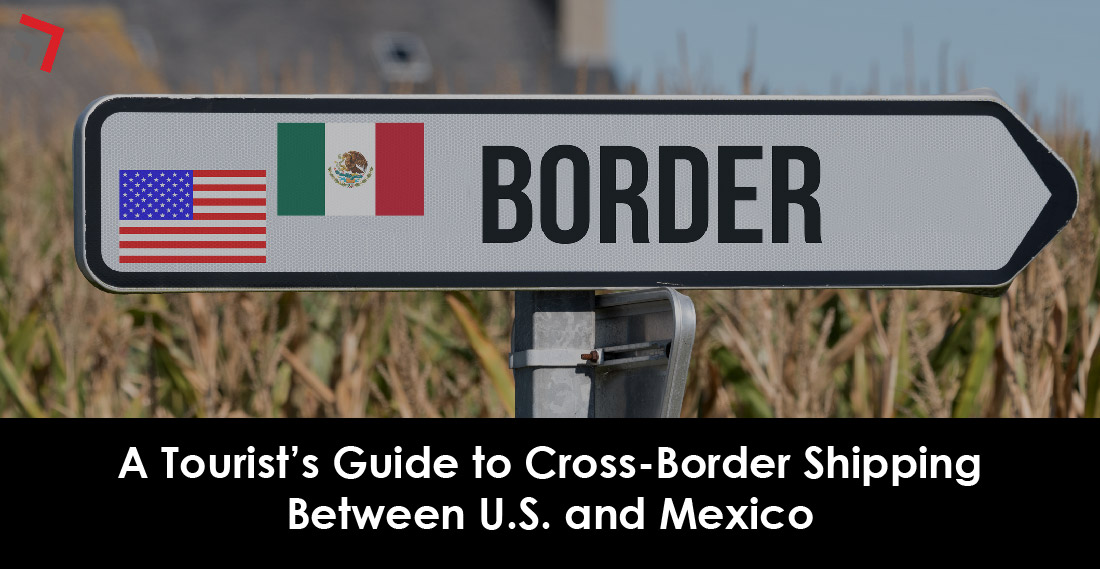Every American knows, whether through personal experience, word-of-mouth, or highly publicized news stories of frat boys defacing seaside resorts, that Mexico is a premier destination for U.S. tourists.
But they may not know what you know, supply chain professional.
Aside from tourism, Mexico is perhaps even stronger in relations with the U.S. in trade. In 2023, Mexico was America’s top trading partner, totaling in value of over $670 billion, and, from the looks of it, the result could very well repeat itself in 2024. U.S. business interests continue to deepen their roots in Mexico as cross-border (between U.S. and Mexico) shipments flourish. While it’s not the case with all U.S. shippers, sooner or later, the next move could be Mexico.
That said, despite the country’s proximity to one another, the complications inherent in international shipping still exist for trade between the U.S. and Mexico. As this partnership grows, it’s important for U.S. shippers to familiarize themselves with cross-border shipping and its best practices.
Since you’re likely reading this while on the clock, let’s go ahead with using an analogy of a tourist’s vacation to explain a cross-border transaction. Don’t get us wrong—we have no doubt that you, supply chain professional, love your job—but we all could use a break. Why not take a vacation vicariously through our blog while learning more about cross-border shipping?
Don’t forget to use a travel agent (hiring a customs broker)
Like a travel agent who has an understanding on the best places for tourists to sleep, eat, and play, a customs broker specialized in U.S.-Mexico trade is an available resource to make the travel of your freight a safer and more relaxed experience for all parties involved.
However, going a step further, unlike what may be the case with a travel agent, a customs broker is essential in cross-border shipping. While a travel agent can score tourists a good hotel deal or free scuba-diving lessons, a customs broker isn’t just an added layer to enhance the quality of a shipment. Without one, you’re putting yourself at risk of penalties and costly delays.
While you, as a shipper, can clear your shipments with customs without a broker, it can be an overwhelming process as U.S.-Mexico trade regulations aren’t as stimulating as reading reviews about taco joints in Cabo San Lucas or parasailing classes in Cancun. Even an error in the smallest of details can lead to penalties or held shipments.
Overall, it’s advantageous to have a customs broker for all shipments, whether that’s to or from Mexico. If you don’t have a customs broker yet, keep in mind that it typically takes a few weeks to get set up in one’s system.
Customs brokerage is one of the many services offered through Commerce Express Inc.’s comprehensive cross-border portfolio.
Don’t forget your passport! (required documents for cross-border shipments)
Can you imagine you’re just hours away from an all-inclusive stay at a magical resort on the pristine Mexican coast? Can you imagine an escape, finally, from the doldrums of a cold and dark winter? Can you imagine your jealous coworkers being reminded of your seven-day excursion with every out-of-office reply they receive from your email? Can you imagine the feeling of missing your flight because you left your passport at home?
Just like a passport that’s required to enter Mexico, your freight also needs some literature to move to and from the two countries. However, unlike the passport—a single document requirement—supply chain professionals, like yourself, need several bits of important documentation. The following are documents required for shipments between the U.S. and Mexico:
- Bill of Lading (BOL)
- Complemento Carta Porte (document generated by carrier, mandated by Mexican law)
- Commercial Invoice
- Carrier Information
- Certification of Origin
- Document of Operations for Customs Clearance (DODA)
- U.S. Customs Declaration
Quite a list, isn’t it? That’s why it helps to have a customs broker at your side. One of our team members is available to discuss any or all of these required documents at greater length!
Choosing the right airline (cross-border provider)
Maybe, this is where the analogy of a tourist’s vacation to explain a cross-border transaction gets a little stretched. Unlike vacations, where flights to and from the destination encompass only a minor part of a trip’s entirety, the choice of carrier will represent the whole journey of a shipment.
Once you have a customs broker set up, the next decision will be which logistics provider will move your freight between the U.S. and Mexico.
In some cases, shippers with large enough volumes work directly with asset-based carriers, or freight companies which own their assets, like trucks, trailers, etc., However, for most shippers, that option is either not available to them or simply not the best strategy to pursue. As we covered last week, thousands of trucking companies exist in the U.S., presenting an overwhelming amount of options for one supply chain professional to sift through. Just like the difficulties of navigating customs without a broker, finding the right service, negotiating the right rate, and trusting that the vendor is reputable is a tedious process to undertake on your own.
That’s where third-party logistics providers (also known as a 3PL, freight broker, or freight forwarder) come into play. While it can be initially challenging to find the right freight broker (as they, too, exist in the thousands across the market), working with one ultimately saves time and, in most cases, money.
Commerce Express Inc. is a freight broker dedicated to finding several options based on clients’ respective shipping requirements and stated expectations. From there, they can choose whichever option presents the best value to them, while ensuring peace of mind that each option will account for the specific demands cross-border transactions require.
Respect the rules of the country (respect the rules of the trade)
For the sake of continuity, we’re continuing the analogy of a tourist’s vacation to explain a cross-border transaction. A tourist, a privileged guest staying in Mexico, ought to respect the rules of the country. For example, it may be legal or socially acceptable in the U.S. to do one thing, while in Mexico, the same thing could be illegal or cultural taboo.
In the realm of cross-border transportation, shippers ought to respect the rules of the trade, otherwise they are putting themselves at higher risk of delays and penalties. While it’s certainly not limited to these items, the following are necessary boxes to check prior to a shipment:
- Ensure your set up with a customs broker at least two weeks prior
- Ensure all information on required documents, like invoices and BOLs, match
- Ensure contact information is exchanged and confirmed, especially for after-hours contacts
- Familiarize yourself with realistic transit times (don’t underestimate the length of a shipment)
Ready to ship across the border?
Congratulations! You have now acquired, or perhaps brushed up on, a basic understanding of cross-border shipping and the best practices for this evolving, growing, sector of trade.
This blog has simply touched the surface of what it means to have effective procedures in place to optimize your team’s cross-border transportation. In order to formulate a more comprehensive strategy, one which considers your team’s unique service needs, operating costs, and timelines, a series of in-depth conversations are typically encouraged. But let’s not get too far ahead.
If there’s interest in determining whether Commerce Express Inc. can be a viable partner to deliver cross-border transport and customs clearance services, let’s start with a 15-minute introductory meeting with Commerce Express Inc.’s Strategic Development Manager Owen Campbell.




Recent Comments